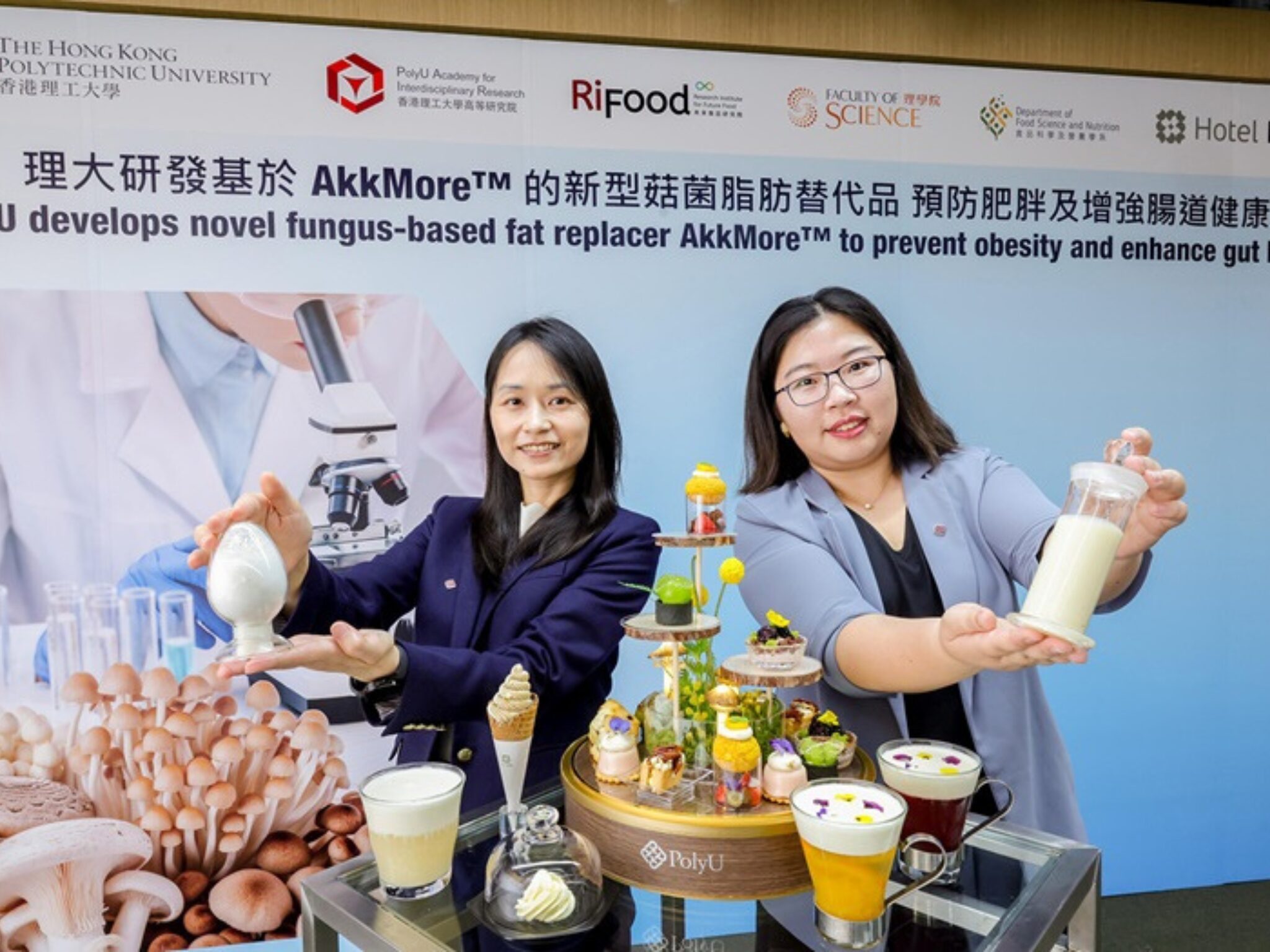4 Mins Read
Researchers in Hong Kong have developed a fungi-derived fat alternative that can decrease the fat content of a product and improve gut health and metabolic benefits.
The alt-fat world has been blossoming lately. Microbes, microalgae, carbon, you name it – startups all over the world are using techniques like fermentation to come up with fats that are better for you, and better for the Earth.
These also hold a key to the progress of an Ozempic-hit food industry, which has contributed to and coincided with a rising awareness of gut health and metabolism.
Joining this list of innovations is AkkMore, a fungi-derived fat designed to replace animal fats while preventing obesity and metabolic diseases, enhancing gut health and immunity, and relieving anxiety. That is the promise of its creators from Hong Kong Polytechnic University’s (PolyU) Research Institute for Future Food (RiFood) and Department of Food Science and Nutrition (FSN).
“Our research team has completed three rounds of animal trials on AkkMore. The results show that the formula can effectively improve metabolism and aid in weight management,” said project co-lead Gail Jinhui Chang, a research assistant professor at FSN. “Moving forward, we are focusing on exploring applications of AkkMore in the development of healthy food.”
Hitting health and sustainability touchpoints
The PolyU researchers have been working on AkkMore since 2022, finding a way to extract the functional component from natural fungal sources. While conducting animal trials puts a question mark over the welfare aspects of the product, mice that had been administered the AkkMore formula were found to have a healthier gut microbiota, indicating better weight management, gut health, immune and metabolic system, and anxiety management.
The research won a Silver Medal at the 2022 International Exhibition of Inventions in Geneva, and its applications for health benefits are being evaluated for patent filings.
“This collaboration is testament to the successful translation of a research outcome,” said Chang. “Moving forward, we will further explore the application of AkkMore formula in innovative health foods and put greater efforts into identification of mushroom strains with better functions and standardisation of the cultivation process.”
In addition to lowering the calorific content of food, AkkMore is also said to extend the shelf life of cream products, and have thickening, emulsifying and stabilising properties. Leveraging these attributes, the PolyU team developed Cream Mate, an alternative cream that can be used in conjunction with conventional cream to reduce the latter’s content in desserts.
This, the researchers argue, could help cut dairy consumption and food waste in the long run, contributing to lower greenhouse gas emissions and higher manufacturing productivity.
AkkMore’s potential for the foodservice industry

To demonstrate AkkMore’s viability for restaurants and the foodservice industry, RiFood and FSN have teamed up with Hotel Icon, which is owned by PolyU, whose fine-dining eatery Green has been using Cream Mate to develop reduced-fat soft serve and desserts.
Hotel Icon commissioned a lab test to assess the nutritional components of the soft serve, which revealed that the fat content of the ice cream using Cream Mate was under 3%, and reduced by over 80% when compared to regular soft serve. Meanwhile, the total calories were also cut by more than half.
Since May 1, the Green restaurant has been running a forest-themed afternoon tea offering with Japanese fruits and AkkMore. The tasting menu includes two Cream Mate soft serves in Japanese hōjicha and Hokkaido milk flavours. Guests can also opt for an Akkmore ‘special drink’ instead of tea or coffee for an additional price.
While this is a limited-edition run, it’s part of a growing roster of alt-fat ingredients targeting sustainability and health in the food sector. In the US, GLP-1 agonist drugs like Ozempic and Wegovy are already making people eat fewer calories and fats as they look to manage their weight. Meanwhile, Roughly 30% of Hong Kong’s residents live with obesity, while another 20% are overweight. Meanwhile, 8.5-10% of people in the city live with type 2 diabetes.
PolyU’s development aims to address these issues, while also lowering the foodservice industry’s climate footprint. The shelf life aspect will also help Hong Kong’s food sector reduce waste – 30-40% of Hong Kong’s municipal waste is made up of food waste, only 4% of which is recycled.




